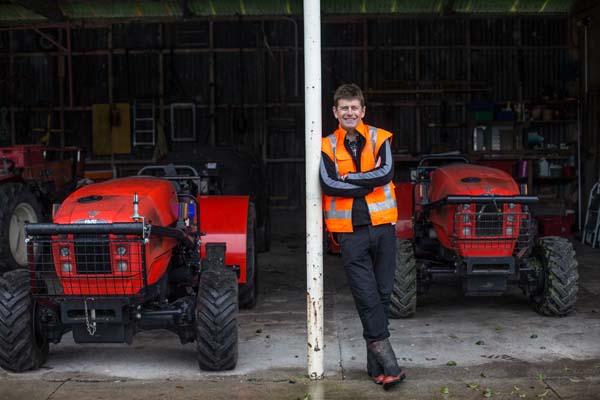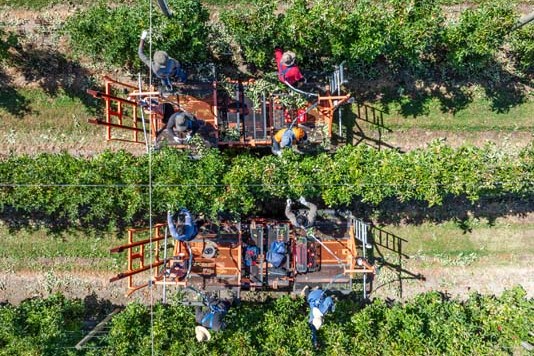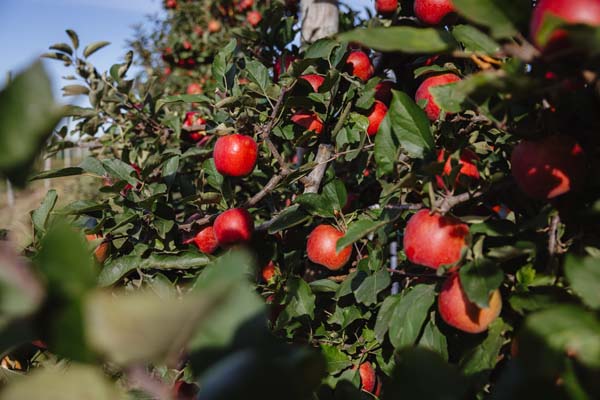Contract Milking SIDE Workshop
Contract milkers, farm owners and farm advisers gave their advice at a workshop on contract milking at this year’s South Island Dairy Event. By Anne Lee.

The Panel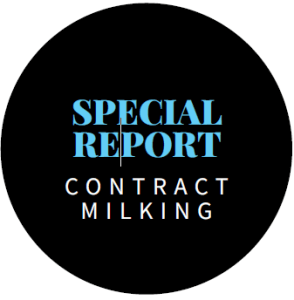
 Maree Crowley and Peter Hughes
Maree Crowley and Peter Hughes
 Multi-farm owners in Southland who came through the traditional pathway to farm ownership from working for wages to 50/50 sharemilking. Now their farm businesses milk 6000 cows through seven farm dairies and produce more than 2.5 million kg milksolids (MS). Farms are run through a mix of contract milking and sharemilking agreements with a manager on the home farm.
Multi-farm owners in Southland who came through the traditional pathway to farm ownership from working for wages to 50/50 sharemilking. Now their farm businesses milk 6000 cows through seven farm dairies and produce more than 2.5 million kg milksolids (MS). Farms are run through a mix of contract milking and sharemilking agreements with a manager on the home farm.
 Jaime McCrostie
Jaime McCrostie
Jaime is a 500-cow, herd-owning (50/50) sharemilker with partner Ben. Jaime completed a PE degree but then went full time dairying. In 2018 she was placed third in the National Dairy Industry Awards farm manager of the year competition. The couple were variable order sharemilking 500 cows before going 50/50 last season. The property has a runoff 20 minutes from the dairy farm.
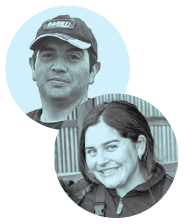 Gonzalo Bascur and Nayabet Espinoza
Gonzalo Bascur and Nayabet Espinoza
Contract milkers on a 700- cow farm near Mokotua, Southland. They have farmed for 10 years in New Zealand, five years on the current farm with this season their second as contract milkers. They have moved up by learning and then executing their plans to achieve strong performance.
 Tony Miles
Tony Miles
Tony and his wife Vicky have progressed through the traditional dairy progression pathway from herd manager to large herd sharemilking and farm ownership. They also have a residential property portfolio and Tony is a director at APS – Agribusiness Performance Solutions farm advisory where he specialises in supporting farms to achieve their financial and production goals.
 Brett McDonough
Brett McDonough
Brett is a Southland-based farm accountant and farm owner with his wife Barbara. He founded Agrifocus – an accountancy and financial services company in 2004 having recognised farmers’ needs for more proactive financial management. The company’s clients include 200 contract milkers and 50 sharemilkers as well as farm owners and runs a benchmarking service.
 Grant Dermody
Grant Dermody
Grant is a client director with NZAB – New Zealand Agri Brokers. The company is involved with capital and debt raising in the agri-sector, financial monitoring and analysis and financial negotiation as well as independent credit analysis.
What to consider when looking at a contract milking job
JAIME: Don’t get carried away by the hype of the interview or the flash house and only focus on the things that excite you about the job. Don’t forget to drill into the details of the system and make sure they’re compatible with how you operate. We are clear about our farming philosophy and the importance of our cows.
We’re passionate about once-a-day milking in August and going 16-hourly from January so we put that in our cover letter. We front-foot that and that way, if we get to the interview stage, everyone is on the same page and we’re not wasting anyone’s time.
PETER: Stick to the production they are actually doing when setting your budgeted production for the contract. Rank the previous operator out of 10 to work out if there is upside on the production for you given your skills.
As owners it’s important to advertise early so we get a good number of applicants. If you leave it late – the end of the year or March then you have disorganised people applying to work for a disorganised farm owner and you have chaos before you’ve even started.
I prefer a photo with the CV and I ring them quickly. I want people who are driving pretty hard towards their goal of farm ownership. Our current contract milker will show them around so they can find out about us from someone who’s working for us and get more information about the job, production, costs etc. They can decide then if they want to continue with the application.
MAREE: Our contract milking jobs are large-scale so we are looking for people who are already contract milking. We like to interview them on their farm because they’ve already seen ours and we can get to know them and how they operate.
For anyone taking on a new contract get professional advice before signing the contract, know the costs and work out what money/profit will be left at the end.
When you go for the interview have a good look at the infrastructure, is it adequate for the job and the rate?
GONZALO: Look at the infrastructure and the records – people can say what they like, but the records are proof especially for production and costs.
NAYABET: Before signing we went through the contract with the farm owner to really understand every piece. We took the agreement to someone with experience we trust. Ours was a basic Federated Farmers agreement, but you still need to understand it well. If you can, talk to a lawyer or rural professional.
TONY: Set your goals, ensure goals between farm owners and contract milkers are aligned. Have clear values and check they are aligned with the farm owner.
GRANT: Have a good advisory team around you – accountant, farm adviser. Have the contract reviewed professionally before signing. Be realistic about the numbers – production and costs.
Don’t be afraid to have a robust conversation with the farm owner if you think their expectations aren’t realistic. If there’s misalignment there right from the outset you could be in for a tough time.
Have an evaluation form to help you assess the job – look at what aspects align with what you are trying to achieve, what doesn’t and then how you’d deal with that contingency.
BRETT: Do all of the above and due diligence on the owners. Ask for names and contacts of people who have worked for them. Do your homework on the details. If it’s a tough year and you’re always at each other’s throats they can break you and vice versa – financially and mentally.
What details about the job do you need to look out for
JAIME: Is there a runoff and are you expected to manage it? How far away is it? It can be a big labour pull so be aware of your responsibilities and labour needed for that. Will you need extra gear for that? Understand calf-rearing requirements and make sure contract payment covers those extras.
NAYABET: Are there enough houses for the people you need? How will you manage it if not – drive in positions, use of neighbours’ houses? Understand the farm and the system.
TONY: Have the conversation about what the contingencies are around production variation because your payment is tied to production. There could be big variations in production year-to-year depending on season and the type of system. Find out what has happened in the past. Having a farm consultant as a go-between can help.
BRETT: Find out what has happened in the past – the farm owner may say they’ll put in feed or do x, y, z but if they haven’t previously, they’re unlikely to start. Get it in writing.
Managing the money – getting started
BRETT: If you’re looking at a 700-cow job in Southland, you’re likely to need about $200,000 to get you through the first season. That pays the wages and funds costs through the first few months before money from the milk cheque starts.
In some cases, the farm owner will set up payments to help cover the first few months, but that’s effectively an unsecured loan so treat that arrangement with respect. They may want to see your budget and variance report over those months.
You’ll still need about $30,000-$50,000 to get started to buy gear such as motorbikes. If you’re arranging an overdraft with a bank you will need to show your saving record. Budgeting starts at a personal level – use DairyNZ’s personal budget. Don’t turn up to the bank with HPs (hire purchases) burning a hole in your pocket and no savings to show for yourself.
GRANT: If you can show the bank your personal budget and that you’ve accumulated a good level of savings that’s going to help. But you need to start managing your money and saving three to five years out from going contract milking.
NAYABET: We went from being spenders to purposely becoming savers with a budget and a compulsory savings account with automatic payments going in. We aimed for $9000 and managed $50,000.
The first year is a big learning curve. We had been managing the farm, but it was like we knew nothing that first year. You know the basics of how to get the cows to milk, but managing staff, payroll, paying GST, accounting software – that was hard.
PETER: If you have the right incoming sharemilker/contract milkers and they’re short a bit of capital then we are generally happy to lend to them – but it’s about getting the right partner in the business and helping them get through.
TONY: If the contract milker can bring some capital to the table we’ve never had too much of an issue with clients helping them through if they’re someone they believe in and really want. But it’s only for the first year.
Setting the contract rate
MAREE: We sit down with our accountant and work it out backwards. What should they be making out of this job and then we add their expenses on top of and get our figure from that. Then we present it to them and they go away and do their budget. It has to be a win/win relationship and open communication is key.
BRETT: It can depend on the person you’re looking to take on – if they have a good reputation at running the system you use then you might be prepared to pay them $20,000 to $30,000 more than someone else because you know they’re going to make you more money than that other person.
GRANT: There has to be money in it for both parties and if there’s not it’s going to be a fraught relationship.
TONY: Rural professionals can help with benchmarking data on what people should be able to make across a range of farm types. You need to think about what exactly you’re including in the contract milker’s job – managing runoff, rearing extra calves will be on top of contract to milk the cows.
Getting the costs right and the first year financials
JAIME: Be careful you don’t underestimate your labour requirement especially if your partner is working unpaid labour – doing MINDA records, farm environment plans, paying accounts, doing health and safety plans and employment admin, crossing cows every morning. They could be off-farm earning income, so factor in their time as a cost that’s met by the contract rate.
Budget, budget, budget. The first budgets I did took three days and three packets of chocolate biscuits. I hated them. I used everyone I could to help – DairyNZ, farm advisers. Make use of them. Check how you are tracking against your budget monthly. It gets easier – now it only takes half a packet of biscuits!
BRETT: In the Federated Farmers contract the farm owner puts down what they think costs realistically are, but check them. They can be out significantly. Agrifocus carries out benchmarking and a classic cost that’s often wrong is power.
Our average power might be $40/cow, but the range is $30 -$80/cow. Don’t go by averages, ask the previous contract milker or ask to see the accounts. Look around, know how many pumps there are, the state of the infrastructure.
Account for tax payments. Take your farm working costs off your gross farm income and then subtract depreciation to get an estimate of your taxable income and then start putting that money aside each month somewhere you can’t easily access it.
When you’re doing GST it’s an opportunity to code up costs and see how you are going to budget every month. It keeps you on track and it also gives an early indication of anywhere you got the initial budget wrong. If you got it wrong, talk to the bank and farm owner, communicate because early intervention can save the day.
If budgeting and financial management isn’t your strength, use professionals, upskill yourself.
GRANT: Planning cash flow is critical because at times through the season there isn’t a lot of money coming in and there are still outgoings. Know your financial position at all times. Know your creditors’ and debtors’ position.
Insurance
BRETT: Insurance requires a professional. Understand what cover you need and the level of cover. If penicillin goes in the milk and a vat is worth $30,000 but you only have $10,000 insurance cover for that, it could send you broke straight up.
GRANT: There are independent, private specialists who can help with this. The impact of getting it wrong can be massive.
NAYABET: We have milk quality, public liability, personal and key person insurance.
People management and conflict resolution
JAIME: Managing people can be a steep learning curve especially if you’ve become a dairy farmer because you generally like cows more than people, but you have to get it right especially when it comes to health and safety.
Being a farm manager first should give you an introduction into managing people, but get professional help if you think you’re out of your depth. There are a lot of resources around too – such as DairyNZ.
Write it down if there’s something annoying you so you can get it off your chest but have the chance to refine your thoughts before you have a face-to-face discussion. It helps take the emotion out of it.
If you have planning discussions or discussions relating to any problems out in the paddock with the farm owner I put a summary of what we agreed to in an email so we’re all on the same page and copy in people who should know so they are in the loop too – farm consultant or bank manager for instance.
GONZALO: We worked on self-development as employers while we were managers.
NAYABET: We talk about how to be good employers with our friends and experiences in our early careers have taught us the kind of employer we don’t want to be.
If you have conflict try and separate yourself from it and take an objective perspective so you can leave emotions aside. We are all human so problems will come up, it’s a matter of dealing with them professionally.
BRETT: Don’t nut off. Sleep on it and try to see other points of view. Get someone independent if you need help. Understand your legal responsibilities as an employer.
TONY: Take time out if there’s a conflict. You know cows and grass, but you need to know about people more. You need to build your people skills to be a great business person.
MAREE: Have mutual respect for each other. Respect people for who they are. We’re all different, we’re all human and things don’t go right 100% of the time. Don’t shy away from the hard conversations. Yes, sleep on it but don’t let it fester either. Keep the communication open, try to hear all points of view and discuss it.
PETER: Don’t employ (or work for) confrontational, argumentative types of people.
What makes a win/win contract milking relationship?
BRETT: Do due diligence at the start and review at the end to make sure you got what you wanted out of it.
GRANT: Remember, it’s about relationships.
TONY: Make sure values are aligned between both parties.
GONZALO AND NAYABET: Involve the farm owner in your plans so everyone is clear what you are working for.
MAREE: Communication is the big key. Know what you are signing up for. Know your five-year plan and if the job is going to get you closer to the goal.
JAIME: Don’t forget to celebrate your successes and make sure everyone gets a pat on the back when things are going well.



